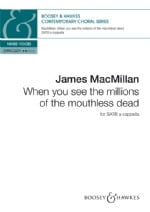MacMillan, James - When You See the Millions of the Mouthless Dead (SATB a cappella)
 for mixed voices (SATB) a cappella
for mixed voices (SATB) a cappella
Text: English (Charles Hamilton Sorley)
Duration: 3 minutes
Difficulty: 2/5
Use: Remembrance, War Commemoration
Composed for the 2015 Cumnock Tryst and first performed on 3 October 2015 in Cumnock Old Church by Genesis Sixteen, conducted by Eamonn Dougan.
This setting of Charles Hamilton Sorley’s war poem was composed for Genesis Sixteen to perform at the 2015 Cumnock Tryst, James MacMillan’s own music festival in Ayrshire, Scotland, marking the centenary of Sorley’s death at the Battle of Loos aged 20. Sorley was born in Scotland and educated in England, with further study in Germany, where he was at the outbreak of World War I. A homophonic, expressive setting of a secular and non-partisan remembrance text, of particular interest to choirs performing war-themed programmes. Suitable for intermediate standard performers.
Text
When you see the millions of the mouthless dead
Across your dreams in pale battalions go,
Say not soft things as other men have said,
That you’ll remember. For you need not so.
Give them not praise. For, deaf, how should they know
It is not curses heaped on each gashed head?
Nor tears. Their blind eyes see not your tears flow.
Nor honour. It is easy to be dead.
Say only this, “They are dead.” Then add thereto,
“Yet many a better one has died before.”
Then, scanning all the o’ercrowded mass, should you
Perceive one face that you loved heretofore,
It is a spook. None wears the face you knew.
Great death has made all his for evermore.
Charles Hamilton Sorley (1895–1915)
James MacMillan
Born in Scotland in 1959, James MacMillan studied at Edinburgh and Durham Universities and now lives in Glasgow. His early successes as a composer in the 1990s included The Confession of Isobel Gowdie, premiered at the BBC Proms, and the percussion concerto Veni, Veni, Emmanuel written for Evelyn Glennie. MacMillan has a special interest in choral composition, ranging from simple liturgical settings for use in church services, to major works for choir and orchestra including Seven Last Words from the Cross, Quickening and St John Passion. His music has been championed and recorded by leading choirs and vocal groups including Cappella Nova, Polyphony, The Hilliard Ensemble, The Sixteen, Westminster Cathedral Choir and the Netherlands Chamber Choir. With their Gaelic inflections and characteristic mixing of ancient and modern, his works have also proved popular with amateur chamber choirs around the world.

